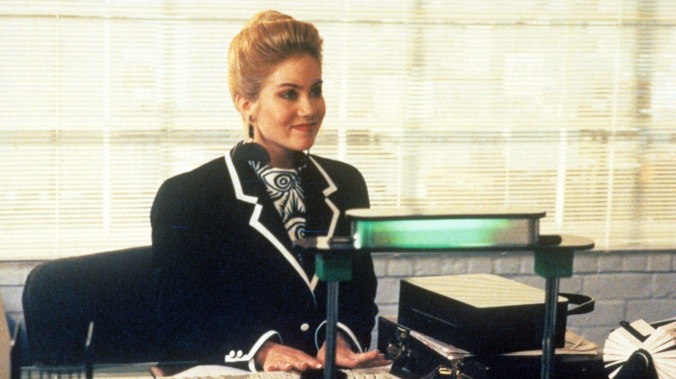Don’t Tell Mom The Babysitter’s Dead offered a dose of reality in the Nickelodeon '90s
Independence, responsibility, and fat vats—Don’t Tell Mom The Babysitter’s Dead was right on top of that, Rose!

Photo: Outlaw/Hbo/Mercury-Douglas/Kobal/Shutterstock
For those old enough to remember it, kids ruled the ’90s. Between our very own “Choice Awards” and a steady stream of slime to shower celebrities with, Nickelodeon, The Disney Channel, and Nerf retailers flooded TV screens with images of independent youngsters with the magical ability to eat McDonald’s whenever they wanted. “Kids rule,” the tagline for 1994’s Camp Nowhere read, and it was an ethos injected into the culture four years earlier with the release of Home Alone. But Steven Herek’s HBO classic Don’t Tell Mom The Babysitter’s Dead offered a darker edge, something closer to reality. It’s why this movie is now a revered cult classic with a remake to call its own.
Home Alone was undoubtedly responsible for the surge in movies about kids wishing freedom from their parents. Movies like Blank Check, Richie Rich, Rookie Of The Year, and Camp Nowhere cashed in on images of latchkey kids eating ice cream and watching rubbish. If only kids had financial independence, that would render their parents unnecessary. Among the first movies of the post-Home Alone kids movie boom, Don’t Tell Mom The Babysitter’s Dead gave this nascent sub-genre its financial fantasies and chased them with harsh realities. Between the catchphrases and grim sense of humor, DTMTBD gave kids an actual taste of the real world, one that young viewers could grow to appreciate.
Don’t Tell Mom The Babysitter’s Dead hit theaters six months after Home Alone. A modest success that would nevertheless receive a critical drubbing, with frequent comparisons to Kevin McCallister’s Christmas vacation, Don’t Tell Mom sees five siblings resuscitating their summer vacation after their babysitter drops dead on the job. Mrs. Sturak’s death isn’t even the first thing on their mind, though. As the title spoils, what and what not to tell Mom (Concetta Tomei) occupies their brain space. Though not poor, the Crandell kids don’t have a McCallister-sized budget and live in what appears to be a vacant lot on the outskirts of Los Angeles. So, to prevent the return of Mom, eldest child Sue Ellen (Christina Applegate), or “Swell,” must work to keep her family fed.
Though it benefitted from the popularity of the child endangerment trend of the early ’90s, Don’t Tell Mom The Babysitter’s Dead wasn’t inspired by Home Alone. Shot months before Cathrine O’Hara’s immortal “Kevin!” would enter the zeitgeist, the film takes influence from Reagan-era satires, like Risky Business, Working Girl, and The Secret Of My Success. That outlook informs Swell’s career path. Herek spends less time fooling Mom and more time on what it takes to be a single female breadwinner feeding a family of five. Much of the film revolves around Sue Ellen maintaining a work/life balance, sacrificing her beach days for overtime pay. While her siblings enjoy a carefree summer, she’s stuck cleaning the fat vats at Clown Dog.
The balancing act of Don’t Tell Mom is why it holds up so much better than other Kids Rule movies of the period. Unlike Rookie Of The Year, Sue Ellen doesn’t get her dream job at an L.A. fashion house by breaking her arm—when her youngest brother (Robert Hy Gorman) breaks his arm, it’s used as a wake-up call for Swell and second-oldest Kenny (Keith Coolidge). Swell lies on her resume to get a leg up in corporate America. When she lands a high-paying executive assistant role, each step is beset by situations that Sue Ellen probably didn’t have the maturity to consider. Her innocent dream of working in fashion is quickly dispelled by vindictive co-workers (Jane Brook and David Duchovny) and her boss’ lecherous boyfriend (John Getz). As if the sexual harassment wasn’t bad enough, the bureaucracy of getting paid proves frustrating for Swell, who begins pinching from petty cash to make ends meet. When her siblings begin stealing from her, she learns that her behavior influences the children she’s supposed to be caring for. Even the film’s oft-quoted catchphrase, “I’m right on top of that, Rose,” has more to do with interoffice politics than actually doing her job.
By balancing the fantasy of independence with the reality of responsibility, Don’t Tell Mom The Babysitter’s Dead stakes its claim as a more mature kids’ movie that viewers can appreciate from different angles throughout their lives. Yes, kids rule, but someone actually needs to rule. That’s probably why the movie holds up so much better than its contemporaries.
The original title of the film was The Real World, which would be a more accurate one, considering the plot. But Don’t Tell Mom The Babysitter’s Dead offers a grim punchline for the film: Mrs. Sturak dies on the job, is wheeled out of the house on a skateboard, and dumped in a parking lot. Potent metaphors for our working lives? Don’t Tell Mom The Babysitter’s Dead is right on top of that, Rose.